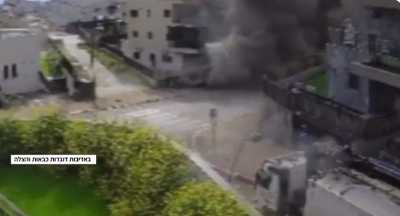Share
Human Rights Voices
While the UN devotes its human rights operations to the demonization of the democratic state of Israel above all others and condemns the United States more often than the vast majority of non-democracies around the world, the voices of real victims around the world must be heard.
Lebanon, March 27, 2024
Druze Israeli Killed in Hezbollah Strike as Tensions Escalate on Lebanon Border
Original source
A 25-year-old Druze Israeli was killed during a massive rocket attack by Hezbollah on northern Israel on Wednesday, the latest casualty amid escalating tensions between Israel and the powerful Lebanese terrorist group.
Zahar Saleh Bashara was working at a paper factory in Kiryat Shmona, which sits on the border with Lebanon, when Hezbollah, which is backed by Iran and wields significant influence in Lebanon, fired more than 40 rockets into northern Israel.
“Zahar was the soul of the factory — he did everything, helped everyone, loved everyone. It’s a loss,” one of his coworkers who survived the attack told Israeli media.
“Unfortunately, we lost the wonderful Zahar while he was working,” a cousin of Bashara added. “He was a truck driver in a paper factory. It was hard to accept the shocking news that he had been killed … Seven years ago his father died and Zahar became the backbone of the family. He worked hard to support his family. Everyone trusted him and he was a father, brother, and son to them.”
The cousin added: “Zahar built his house, prepared it completely, and was supposed to get married soon and make the whole family happy, but unfortunately he passed away before he could fulfill his dream. Everyone loved him. Zahar always helped people without hesitation. He was a responsible and honorable person and smiled, and everyone always said beautiful and good things about him.”
The attack started at around 8 am local time, with rocket sirens lighting up the Galilee region. Hezbollah soon claimed responsibility for the onslaught.
First responders pulled Bashara’s body from the rubble, declaring him dead at the scene, according to Magen David Adom, Israel’s national emergency response service.
Bashara was a resident of the Druze village of Ein Qiniyye in the Golan Heights.
While the Druze community has largely been critical of Israel’s war effort, the Druze serve in high numbers in the Israel Defense Forces (IDF), achieving positions of power within the army.
Beyond the military, several Druze serve at high levels of Israel’s government, including in the judiciary.
A notable soldier of Druze background was Lt. Col. Salman Habaka, a 33-year-old commander from the 188th Armored Brigade’s 53rd Battalion who was killed fighting Hamas in Gaza in November. When he died, Habaka was the highest-ranking Israeli soldier to fall in Gaza since the current war began. He left behind a wife and two-year-old son.
Habaka’s story made the rounds in Israel due to his heroism on Oct. 7, when he was one of the first soldiers to enter Kibbutz Be’eri and fight to free the community, which was attacked by Hamas terrorists.
In Israel’s north, Hezbollah terrorists have been firing rockets at Israel daily since Hamas’ Oct. 7 massacre, leading Israeli forces to strike back. Tensions have been escalating between both sides, fueling concerns that the conflict in Gaza — the Palestinian enclave ruled by Hamas, another Iran-backed Islamist terrorist group, to Israel’s south — could escalate into a regional conflict.
Tens of thousands of Israelis have been forced to flee their homes in northern Israel due to constant Hezbollah attacks.
The IDF said earlier this month that it had targeted more than 4,500 Hezbollah targets since the outbreak of the war against Hamas on Oct. 7, including weapons shipments and production facilities used to manufacture rockets and other munitions. Hezbollah has identified more than 240 of its members killed by Israel since Oct. 8, but the IDF puts that number at over 300, including senior operatives. Israeli strikes have also targeted Hezbollah operatives in Syria as well as members of other terror groups, including Iran’s Islamic Revolutionary Guard Corps (IRGC).

